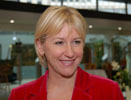
Today marked U.N Special Representative for Sexual Violence Margot Wallström’s first day on the job. The position, created last September in Security Council Resolution 1888, is the first of its kind and representative of the international body’s recognition of the urgency of confronting sexual violence around the globe.
A woman with “a million ideas” to confront sexual violence, Special Representative Margot Wallström intends to begin her two-year appointment focusing on the Democratic Republic of Congo, the Women’s Radio Network reported on Friday. Wallström’s enthusiasm could not be better timed, as a report released last Wednesday by the Internal Displacement Monitoring Centre , or IDMC, pointed to the over 2.1 million displaced in Congo who subsist in deteriorating humanitarian conditions – among them, persistent sexual violence.
For Wallström, concentrating on the Congo was an obvious choice: "The reports we get from the people we work with on the ground are so serious that we cannot but focus our efforts and reinforce our efforts in the Congo." The IDMC report noted (citing an Oxfam survey) that “sexual violence has increased dramatically since the military offensives against the FDLR [one of eastern Congo’s brutal rebel groups] began in January 2009.” According to the U.N.’s latest estimate, more than 8,000 women were raped in 2009 in Congo’s Kivu provinces alone, not to mention that many rape cases go unreported because victims are ashamed, fear retribution, or are otherwise unable to come forward.
As explained by Women’s News Network, each of the seven nations and numerous militias involved in the conflict in eastern Congo have been “accused of committing acts of sexual violence.” Ms. Wallström’s response? She hopes to use a wide range of strategies to combat sexual violence in Congo, from working with non-governmental organizations on the ground to decrease the impunity rife among perpetrators of sexual violence, to utilizing 21st century technologies to protect women and identify assailants. On this idea, Ms. Wallström defiantly asked, “Why in Africa can we not use laboratories and DNA to trace perpetrators, why can’t we use GPS to track women?” The willingness of Ms. Wallström to think creatively about new ideas to confront a staggering problem in Congo will be a welcome addition to the international community’s response to the conflict.
Despite the immensely complicated nature of the fighting that has plagued Congo for 12 years, Margot Wallström seems undaunted by the task of stemming sexual violence: "We can deal with this problem, we can do something about it. I hope we will not just be another talk shop, but make sure that things change on the ground."

